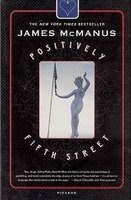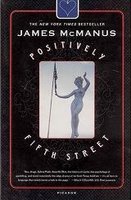A Good Read: McManus Tells the Story of Poker
 I mentioned a couple of times recently having gotten myself a copy of Cowboys Full: The Story of Poker, the new history of poker by James McManus. I’ve finished it and have in fact written a review of the book for another outlet, so I’m not that inclined to review it formally here as well. However, as the book is officially due out next week, I thought I would go ahead and share a few thoughts regarding it here.
I mentioned a couple of times recently having gotten myself a copy of Cowboys Full: The Story of Poker, the new history of poker by James McManus. I’ve finished it and have in fact written a review of the book for another outlet, so I’m not that inclined to review it formally here as well. However, as the book is officially due out next week, I thought I would go ahead and share a few thoughts regarding it here.We’ve been hearing about this one for a long time, actually. I first recall reading something about it several years ago, with a 2009 target date for publication being mentioned. McManus, of course, carved himself an important place in the poker publishing business with his Positively Fifth Street, which first appeared in 2003 (a great year for anything poker-related to appear). Wrote something about that one way back during the early days of Hard-Boiled Poker, if you’re interested.
Those of you who have read Positively Fifth Street know that it is certainly a page-turner for (most) poker players. The book probably has some appeal to non-poker players, too, although I recall Vera Valmore never could get into it, having been turned off somewhat by the salacious opening scene detailing the murder of Ted Binion.
Positively Fifth Street ultimately weaves together three primary storylines. There’s the murder of Binion and subsequent trial of Sandy Murphy (his girlfriend) and Rick Tabish (her lover). There’s the 2000 World Series of Poker, for which McManus had been hired by Harper’s Magazine to produce a feature on women in poker. Then there’s McManus’s own involvement in the WSOP that year, where he won a satellite into the Main Event and then proceeded to make the final table, finishing fifth.
 The book also includes numerous other digressions regarding the history of poker, plus stories from McManus’s family tree. In fact, while the primary storylines were all compelling enough, those digressions were my favorite parts of Positively Fifth Street. They did, of course, make the book longer than it needed to be, and I think it is safe to say even though I found the book engaging from beginning to end, I sensed how it could have stood some editing and/or reorganizing. Thus I’d rate Positively Fifth Street a notch below other “classic” poker narratives like Al Alvarez’s The Biggest Game in Town or Anthony Holden’s Big Deal.
The book also includes numerous other digressions regarding the history of poker, plus stories from McManus’s family tree. In fact, while the primary storylines were all compelling enough, those digressions were my favorite parts of Positively Fifth Street. They did, of course, make the book longer than it needed to be, and I think it is safe to say even though I found the book engaging from beginning to end, I sensed how it could have stood some editing and/or reorganizing. Thus I’d rate Positively Fifth Street a notch below other “classic” poker narratives like Al Alvarez’s The Biggest Game in Town or Anthony Holden’s Big Deal.(Incidentally, it appears a film adaptation of Positively Fifth Street is in the works, although we’ve been hearing about that pretty much since the book first came out six years ago.)
Soon after Positively Fifth Street appeared, McManus began writing a regular poker column for The New York Times. If you remember, at the time we were in the midst of that “poker boom” and his landing that position was rightly viewed as further evidence of poker’s splash into the mainstream. Of course, the Unlawful Internet Gambling Enforcement Act of 2006 came along to stem the tide and somewhere in there McManus stopped writing for the NYT. He did resurface, however, with columns in Card Player (starting in late 2006) which in fact were essentially chapters from his forthcoming history of poker.
If you’ve read any of those Card Player columns, you have a good idea what to expect in Cowboys Full. The book is comprised of 52 chapters (a nice, pokery number) which mostly follow a chronological progression from the ancient world and early gambling games on up through the invention of playing cards and eventually poker.
Most of the book focuses on poker in America, and thus pursues an early-stated thesis about how poker fits neatly within a peculiarly American ethos. Says McManus, poker provides a perfect context within which to highlight the “American DNA,” which “expresses itself -- in some environments, at least -- as energetic risk-taking, restless curiosity, and competitive self-promotion.” There’s more, but you get the idea: to us Yanks, poker ain’t just a game, and so it is worth our while to tell its story.
The book then carries that story all of the way through its having been the “cheating game” on 19th century riverboats and in Old West saloons to its growth during the 20th century to the birth of the WSOP and on up to the present, including discussions of the UIGEA, the cheating scandals on Absolute Poker and UltimateBet, and the most recent WSOP. Lots of gripping anecdotes throughout, and, like McManus’s earlier poker book, a definite page-turner.
I will say -- also like Positively Fifth Street -- that McManus’s new book is similarly lacking somewhat in terms of editing and organization. There are more than a few moments along the way when I found myself traveling down some digressive path away from the story of poker and through some other, tangential tale from the Civil War or presidential history or the like. (“What does this have to do with poker, again?” I’d wonder.)
In other words, one gets the feeling the author kept just about everything from that first draft, even if perhaps it might’ve been a good idea to trim things up a bit here and there. Kind of like a band who rather than craft a single disc every year or two churns out albums every month. Which is awesome if you really dig the band and love everything they do, but less dedicated followers might appreciate a little more selectivity.
Then again, at around 500 pages, Cowboys Full does present itself as a kind of definitive, all-encompassing reference work, and so it probably isn’t that fair to complain about it having included too much. (Although, like I say, some of the tangents might seem not-so-vital to “the story of poker.”)
All in all, the book should prove highly entertaining to those wanting to learn more about the history of the game, and useful to those interested in writing about poker’s storied past, too. Probably not a bad ideer for a Christmas gift, I’d think, for that poker player in yr life.
Labels: *by the book, Cowboys Full, James McManus, Positively Fifth Street















